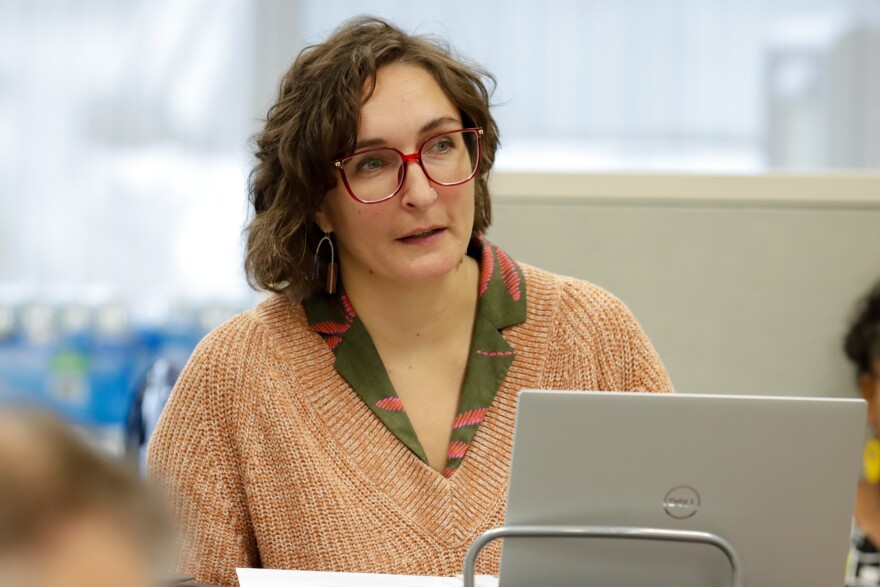Update, Wednesday:
The White House on Wednesday pulled back the order that called for a freeze on federal funds and that sparked widespread confusion. It says it will still review federal spending.
Original story:
A federal judge has blocked the Trump administration’s partial freeze on federal spending, capping a day of massive confusion in Alaska and the rest of the country.
The stay, though, is temporary and still leaves a lot of uncertainty across Alaska, in federal offices, local governments, schools and nonprofit organizations.
“Yeah … it's been a day,” said Meg Zaletel, executive director of the Anchorage Coalition to End Homelessness. “And it's been one of uncertainty, scramble, looking for answers that aren't easy to find and trying to figure out where the impacts lie.”
The source of the confusion: An internal memo the White House Office of Management and Budget issued Monday night directing agencies to halt “federal financial assistance” for review to make sure the payments were in keeping with President Trump’s executive orders.
No one could say exactly which programs would be subject to the spending freeze and for how long.

Republican U.S. Sen. Lisa Murkowski said concerned Alaskans were contacting her office all day, trying to understand whether money for their program or agency was included in the freeze and how long it would last.
“The big challenge right now is finding people in the administration who are in a position to help us facilitate some of the answers to these things,” Murkowski said Tuesday afternoon.
An example of the tumult of the day: Some Alaska Head Start parents were told funding was uncertain and they needed to find alternative care for their children starting Wednesday at 7 a.m. for at least the next two weeks. A follow-up message an hour later said the funding would not be impacted after all.
A vague, yet sweeping memo
Part of the confusion was that the initial memo announcing the spending freeze was sweeping but also vague.
It orders agencies to “temporarily pause all activities related to obligation or disbursement of all Federal financial assistance, and other relevant agency activities that may be implicated by the executive orders, including, but not limited to, financial assistance for foreign aid, nongovernmental organizations, DEI, woke gender ideology, and the green new deal.”
The White House issued another memo Tuesday limiting the scope. It says, for instance, that Medicaid, SNAP and student loans would not be frozen. It also says that the reviews could be finished in as little as a day.
Among the Alaska grantees most affected by a freeze would be Alaska’s government.
The state of Alaska depends on federal funding for a wide range of services, from roads and bridges to education, health care and resource development. More than half of the state’s revenue came from federal funds in the 2022 fiscal year, a larger share than any state except Louisiana. As of midday Tuesday, Gov. Mike Dunleavy’s office said they didn’t have specifics either.
“We are awaiting further guidance from federal OMB and continuing to assess potential impacts as further information is released,” said Jeff Turner, the governor’s communications director.
Dunleavy is an ally of Trump’s. State Sen. Bill Wielechowski, D-Anchorage, put the stakes in more blunt terms.
“We're one of the largest recipients, per capita, of federal funds in the United States,” he said. “We've got billions in infrastructure dollars. We've got billions in natural resource projects. We've got permitting issues that rely on federal officials. And this potentially is putting a pause on much of that, if not all of it.”

Wielechowski said even a temporary freeze “has the potential to throw a wrench in the state, for at least the short term.”
Uncertainty across the state
A more typical response, at offices and organizations large and small, was anxious uncertainty.
“All of those questions are front and center for everybody,” said Nils Andreassen, the executive director of the nonprofit Alaska Municipal League. “What does this mean and what does the future hold for our plans for these coming years to implement all these projects?”
Alaska Native Tribal Health Consortium spokesman Shea Siegert said tribal leaders will fight to ensure the federal government upholds its trust responsibilities. Meanwhile, he said, the organization’s sole focus “is on delivering the highest echelon of care to the people we serve.”
“Clearly, this is a rapidly changing situation, and many of the questions being asked will ultimately be answered by the courts,” he said.
University of Alaska Fairbanks Chancellor Dan White said he’s seeking more information from the University of Alaska system’s attorneys about the impact to the university.

“From this guidance, we hope to have clarity on actions that will or may need to be taken as a result of the orders,” he said in an email to students and faculty.
Todd Brinkman, who chairs the wildlife biology program at UAF, said he’s trying to keep a cool head about the impact on students and on research projects — especially those that are tied to the university’s $20 million in National Science Foundation grant funding.
“At this stage, I'm trying to avoid being too reactionary until I find out what the implications are of the changes that are coming down the pipeline,” he said.
Anchorage city officials were monitoring the situation Tuesday and identifying the programs that might be affected, said Amanda Moser, the mayor’s external affairs director.
The Alaska Housing Finance Corp. has housing initiatives across the state, providing affordable housing, rental assistance, energy efficiency and service to homeless populations.
“Our agency is going through the process right now of identifying what if any impact there will be to the various programs,” said Stacey Barnes, director of governmental relations and public affairs.

Zaletel, with the Anchorage Coalition to End Homelessness, said she was particularly concerned about the impact on rental assistance programs her organization offers. Though federal guidance explicitly exempts rental assistance from the freeze, Zaletel said she was still worried.
“We don't know what that means,” she said. “We don't know if that means only direct, federally paid to the individual rental programs. Most of the programs we deal with are pass-through.”
But even before the freeze was supposed to take effect at 1 p.m. Alaska time, she said, a federal Department of Housing and Urban Development payment system known as eLOCCS was unavailable, jeopardizing the group’s ability to file for reimbursement on federal grants that fund homelessness programs.
“Last night, it went down, and it didn't ever function again today, where anyone could get to the drawdown page to put in their funding requests or their funding reimbursement requests,” she said.
‘Friends in high places’
Meanwhile, staff at the nonprofit Alaska Association of School Boards started work at 6 a.m. to ensure they had necessary funding requests filed in time, said executive director Lon Garrison. They were going off the reports that the freeze would start at 5 p.m Eastern.
“When that notice came across last night, you know it was like, ‘Okay, all bets are off,’” Garrison said. “This is what we have to focus on in order to make sure that, one, can we continue? And can we cover what's already been spent by districts and by our organization?”
State Sen. Löki Tobin, D-Anchorage, said she was particularly worried about the damage the pause in spending would do to the state’s nonprofit sector. She said she was worried the effects could linger even if the freeze is eventually lifted.

“Alaskans should be deeply concerned,” Tobin said. “Even though this has been communicated as a pause and an opportunity to evaluate federal spending priorities, the consequences of even this brief moment could be catastrophic across our state.”
Food Bank of Alaska’s government affairs director, Ron Meehan, said his nonprofit was working with its partners to assess the possible impacts on its programs.
“There's just a lot of uncertainty,” he said. “It has the potential to really be very wide-sweeping in terms of the number of programs that it would impact, that we either directly help get out or that our partners and neighbors benefit from.”
Robert Venables, executive director of Southeast Conference, a regional economic development organization, said organizations across the state are understandably confused by the sweeping action. But he added that the situation should become clearer as federal agencies review different programs and identify which will and will not be affected.
“I would hope and expect that over the next few days we’ll get a lot more clarity, and see legally binding contracts between the U.S. government and states, communities, NGOs and other entities separated from those programs and awards that the administration wants to take a much closer look at,” Venables said.
Dunleavy, a Republican, has a close relationship with Trump, and some state senators said they hoped he would leverage the relationship to communicate the freeze’s effects on the state.

“We've got friends in high places that can at least let the president know the impact it's having on us,” Senate President Gary Stevens, R-Kodiak, said.
Congressman Nick Begich, a Republican, issued a statement that was generally favorable to the spending freeze, saying it showed Trump was living up to his promises and citing the need to cut the deficit.
Republican U.S. Sen. Dan Sullivan maintained neutrality in a statement his office issued.
“The pause is more limited in scope than some initial media reports suggested, but I still have concerns on how it can negatively impact Alaskans,” it read in part.







